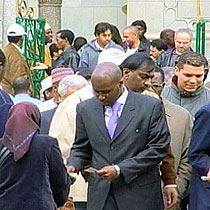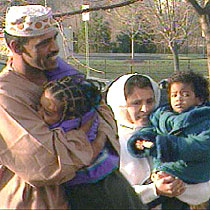2007年VOA标准英语-Symposium Examines Islam in American Society(在线收听)
Washington
07 May 2007
A recent symposium in Washington, D.C. examined "What does it mean to be Muslim in America?" Georgetown University's Center for Muslim-Christian Understanding hosted the event, along with On Faith, an interactive conversation on religion sponsored by Newsweek magazine and The Washington Post newspaper. VOA's Mohamed Elshinnawi has more.
 |
"I do not really know a lot about Muslims,” admitted one woman. I can't claim to know a lot. I do not know what they believe in or the tenets of their religion."
A man on the street felt, "I am scared of it to be honest with you, it brings a little bit of fear to me after being here 9/11."
Another woman said, "To a certain extent, it seems like an aggressive culture."
Reporter Sally Quinn, a symposium panelist, admits that she has heard many such misconceptions about Islam in America. "I began to see how difficult it is to be a Muslim in this world, particularly to be a Muslim in the U.S. because I know that what we see in the papers and the actions of the few do not represent the tenets of the Muslim faith. There are still a lot of negative perceptions there." Quinn says these perceptions are formed because most Americans know very little about Islam.
But Hadia Mubarak, a senior researcher at Georgetown Center for Muslim-Christian Understanding and the president of the National Muslim Student Association offers another explanation.
"I think the problem is that people are looking at the current tension between the U.S and the Muslim world through the lenses or the prism of religion when it really has nothing to do with Islam whatsoever."
Mubarak argues that certain political, socio-economic and historical grievances in much of the Muslim world are what really fuel anti-Americanism.
Ingrid Mattson, president of the Islamic Society of North America and Professor of Islamic studies at Hartford Seminary in Connecticut, agrees. She adds that sensational media coverage that dwells on Muslim violence fuels anti-Muslim sentiment in the West. "The media need to represent Muslims better, to clarify the reality of the position that those people who are extremists, who are doing acts of violence are marginal."
 |
| Muslim family |
"We are working hard and we are fortunate in having so many partners, especially in the interfaith community,” says Mattson. “Christian organizations, Jewish organizations, interfaith organizations, who want to help us by educating their members to understand Islam and not be intolerant towards us."
Muslim American businessmen also launched Bridges TV, a 24-hour cable channel to explain Islam and educate the public about their Muslim neighbors.
Imam Yahya Hendi, the Muslim Chaplain at Georgetown University, says that American Muslims should also assert themselves as an integral part of the American society: "We are here to stay, there are seven million Muslim Americans and this is our country. For me what does it mean to be Muslim American is to be loyal to our country, America, to our values as Americans but also to be loyal to our values of Islam."
Hadia Mubarak says with more understanding of what Islam is all about, the American public will be more comfortable with Muslim Americans. "In fact there is nothing about Islam that makes it incompatible with western democracy or western values of human rights and gender equality and everything that we value as Americans."
Salman Ahmad is a Pakistani-American rock musician. He says that Muslim Americans can use Islamic art, poetry and music as a cultural bridge to humanize their identity.
"The Sufi music that comes out from the sub-continent and from Persia is a heritage from Muslims who rediscovered their own identity, and also as a way to build a bridge between the Muslim world, the West and America," says Ahmad.
He says modern music can be a vehicle for bridging the ancient gap between Islam and the West.